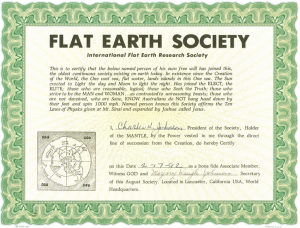 There is a small minority that makes heartfelt arguments that the Earth is flat. Do they deserve half of the news coverage related to global geography? Two maps in every story?
There is a small minority that makes heartfelt arguments that the Earth is flat. Do they deserve half of the news coverage related to global geography? Two maps in every story?
Likewise, there is a small minority that argues humans with a certain skin pigmentation are superior to people with different pigmentation. Do they deserve half of the news coverage about race-related issues?
There also is a small minority that claims the moon landing was a hoax. Did they deserve half of the coverage of moon landings?
In all of these cases, giving minority viewpoints roughly half of the news coverage would have created a false impression that scientists are roughly evenly split about the shape of the planet, the inferiority of some skin colors and the feasibility of space travel. This kind of reporting would have been promoting things that nearly all scientists have proven to be false.
Which brings us to climate change. This week, the British Broadcasting Corporation (BBC) Trust recommended that BBC reporters no longer give equal time to the small minority of scientists who contend that climate change is not happening and/or is not impacted by human activity. A BBC Trust report recommends:
The Trust wishes to emphasise the importance of attempting to establish where the weight of scientific agreement may be found and make that clear to audiences. The BBC has a duty to reflect the weight of scientific agreement but it should also reflect the existence of critical views appropriately. Audiences should be able to understand from the context and clarity of the BBC’s output what weight to give to critical voices.
So, at a time when 97% of climate scientists have found that climate change is happening and is aggravated by human activities, half of the news coverage should not be dedicated to the viewpoint of the 3% of scientists who disagree.
Despite the increasingly lopsided scientific consensus on climate change, a 2013 report done by Media Matters found that half of print news outlets used a false balance approach to climate change reporting. On Fox News, 69 percent of guests cast doubt on the science. On CBS news, in reporting about a rigorous United Nations scientific report, climate change deniers were given more than six times their representation in the scientific community.
The BBC Trust is politely telling its reporters to knock it off. It is telling them to make sure their reporting reflects the reality of broad scientific consensus on climate change.
It’s time for Minnesota’s most thoughtful journalism leaders to follow suit. Star Tribune? MinnPost? Minnesota Public Radio?
– Loveland
